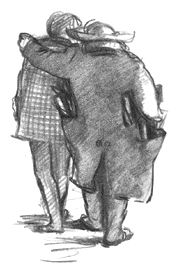Vie de Boheme – how the Bohemian Club was formed

19 of 24
The story so far … homeless artist and musician Alexandre Schaunard has been traipsing the streets of Paris, searching for anyone from whom he can borrow a few francs. He meets a philosopher, Gustave Colline, they share a meal and, as firm friends, they move on to another café in search of alcohol and coffee. There they meet two gentlemen, M. Mouton and M. Rodolphe, in the middle of a heated exchange. They are asked to leave and Schaunard, forgetting he is homeless invites everyone back to his lodgings. Now read on.
When they reached the top of the stairs, after a long and difficult ascent, Schaunard, who went in front, exclaimed in astonishment to see a key in the door of his room.
“What’s the matter?” asked Rodolphe.
“I don’t understand it at all. I find here in the door the key that I took away this morning. Let me see; I put it in my pocket – and bless me, here it still is!” He produced a key. “It’s magic!”
“It’s phantasmagoric!” said Colline. “It’s fantastic!” said Rodolphe.
“But do you hear that?” said Schaunard, his voice beginning to quaver with fright.
“What?”
“My piano – playing all by itself. Ut, la, mi, re, do, la, si, sol, re – ah, that rascally re, it will always be false.”
“But surely it can’t be your room,” said Rodolphe, adding in a whisper to Colline: “He’s drunk.”
“Yes, he must be. To start with, it’s not a piano, it’s a flute.”
“Then you’re drunk, too, my dear fellow,” the poet said to the philosopher, who was sitting on the landing. “It’s a violin.”
“A vi– Pooh! I say, Schaunard!” Colline spluttered, clutching at his friend’s legs. “That’s rich, that is! This gentleman here says it’s a vi–”
“Deuce take it!” Schaunard exclaimed, thoroughly dismayed. “My piano is still playing. It’s magic.”
“Phantasma-goric,” Colline yelled, letting fall one of the bottles he was holding.
“Fantastic!” yelped Rodolphe.
During this tumult, the door of the room opened, and on the threshold appeared a person holding a three branched candlestick with pink candles.
“What can I do for you gentlemen?” he asked, bowing courteously to the three friends.
“Good heavens, what have I done?” said Schaunard. “I’ve made a mistake, this is not my room.”
“Sir,” Colline and Rodolphe both spoke at once to the person who had opened the door, “please excuse our friend. He’s drunk to the teeth!”
Suddenly a ray of lucidity penetrated Schaunard’s drunkenness. He had just read on the door a message written in chalk:
I came three times to fetch my things. – PHÉMIE
“But yes, yes, I am – I am at home!” he exclaimed, “that’s the visiting card Phémie left on New Year’s Day. It’s my door, all right.”
“Confound it, sir,” said Rodolphe. “I’m thoroughly confused!”
“And I assure you, sir,” said Colline, “that for my part I actively participate in my friend’s confusion.”
Vie de Bohème by Henry Mürger, a vivid portrait of the ‘Bohemian’ life of the artistic quarter of Paris in the nineteenth century was originally published (by Michel Lévy) in 1851. The extract above is taken from a translation by Norman Cameron, published by Hamish Hamilton. The illustration is by Dodi Masterman.
Leave a Response
You must be logged in to post a comment.

